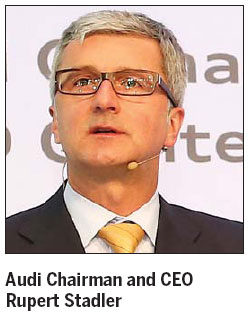In another move to cement its two-decade reign in China, German premium carmaker Audi AG opened a research and development center in Beijing on Feb 1 that it said will help localize products for Asia.
More than 300 R&D experts at the center will work on new engines, car bodies, electronics and batteries, said Audi. It also has a prototype workshop, vehicle test facilities and 3D development environment
Teams will be active in product customization for Asian customers, including solutions in electronics and connectivity, said the company.
"We expand our global R&D network with this site and further strengthen our innovative power in Asia," said Audi Chairman and CEO Rupert Stadler.
"We learn what customers desire in China and in the rest of Asia and will develop products and solutions even more adapted to their special needs and desires," Stadler said.
Audi's China sales set a new record in 2012 with 405,838 deliveries, an increase of 29.6 percent from a year earlier. The figure accounted for more than a quarter of the company's global sales and more than a third of overall premium car market in China last year.
The company last month announced that it planned to grow its annual sales in China to 700,000 cars by 2015.
"China has become a kind of a homeplace for Audi - this is our most successful stand-alone market in the world," he added.

Other global automakers are also strengthening their R&D capabilities in China to learn the needs of local customers amid mounting market competition.
Daimler AG, parent of Mercedes-Benz, started building an R&D center at the end of 2011 at its passenger car joint venture with Beijing Automotive Co, part of its total investment of $3 billion to expand in China from 2011 to 2015. The center is expected to be operational next year.
Japanese carmaker Toyota Motor Corp is constructing0 a $689 million R&D center in East China. The facility will begin operation in 2013 and be Toyota's largest R&D center in the world.
Audi said its R&D center in Beijing will play a driving role in developing energy vehicles. The company has already been operating a technical test fleet of its e-tron cars in China to test electrical performance under special conditions.
With its massive urban centers, China is expected to become of the leading markets for e-tron technologies in the future, the company said.
Dietmar Voggenreiter, president of Audi China, said the R&D center in Beijing will cooperate closely with development departments at its joint venture FAW Volkswagen in northeastern city of Changchun.
Audi has a 10 percent stake in the joint venture and its parent Volkswagen Group holds 30 percent. Chinese automaker FAW Group Corp controls 60 percent.
The joint venture now has two plants in Changchun making the Audi A6 sedan and a range of Volkswagen models.
The tie-up will start to make the compact Audi A3 at its new plant in southern China.
